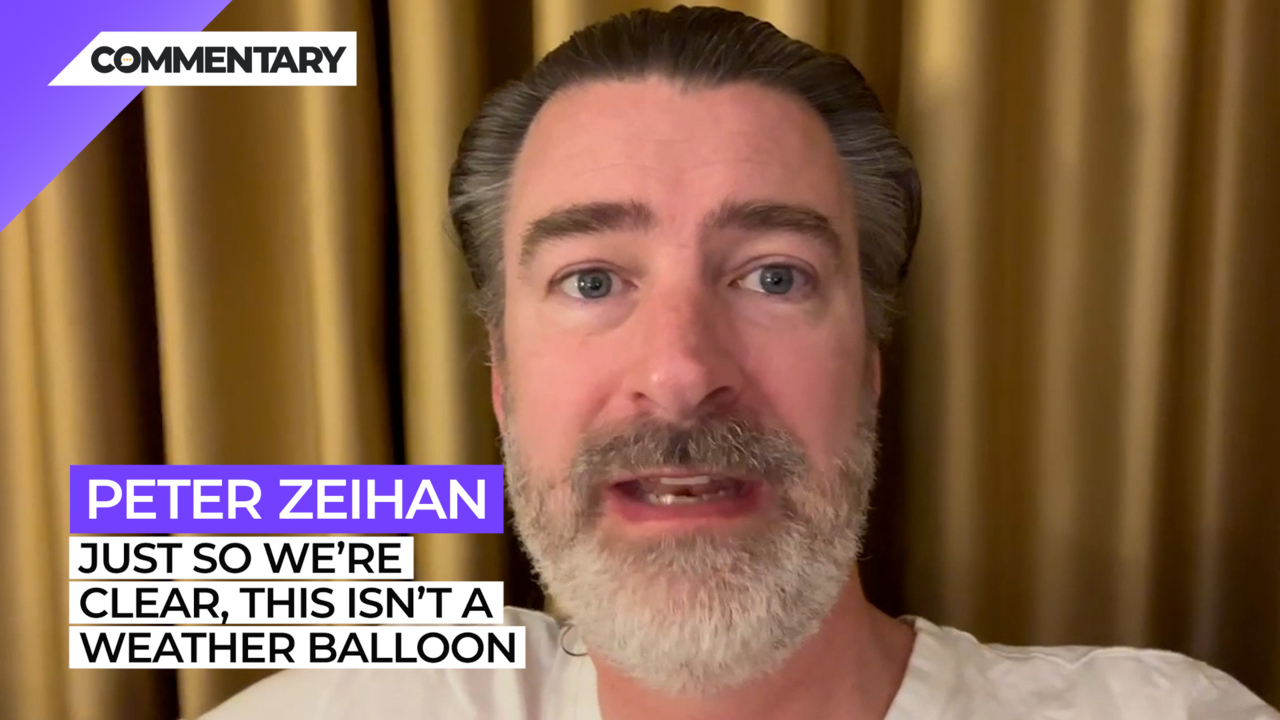
Commentary
-
Our commentary partners will help you reach your own conclusions on complex topics.
Everybody, Peter Zion coming to you from another exciting hotel room. Today, today is balloon day. Now I realize it’s been quite a while since the balloon was first sighted and brought down. But you know, part of being a generalist is knowing when to keep your mouth shut, because you don’t want to just talk about things you don’t know much about. And balloons have never made my top, you know 1000s list of things I consider myself a semi expert in. So I had to go out and speak to a few people. Let’s start with what the Chinese were technically trying to do. They were doing overflight of a lot of our military bases, specifically our ICBM launch facilities, because the Chinese are new to having a nuclear deterrent in the idea of having reinforced bunkers and silos. And so everything from the type of fuel solid versus liquid, to the type of reinforcements that will type of launch classic capabilities to the stage and other rockets. They’re all relatively new to all of this, certainly to doing it at scale. Remember that as early as the 1970s, the United States had over 30,000 nuclear weapons, about 1/3 of which would have been deployed by missile. Now with arms control treaties and the post cold war environment, we have slimmed that down to just a few 100. But the United States has a deep bench of experience in building and maintaining these things. And the Chinese simply don’t, until very recently, their entire deterrent was just about 100 or so missiles. And they’re trying to beef it up part of the general effort to get into great power competition, and they have a very long way to go. So any little peek that they can get would be great. From their point of view, obviously, from the American point of view, we have a slightly different view of that. Now, when it first came out, like a lot of people didn’t really know what was going on. And so my first thought was like, you know, why would the Chinese I mean, a balloons are big, they’re slow moving, you can’t maneuver them very well. They’re obvious. And so it’s like, you know, I haven’t thought very much of the leadership of Zhi Jing ping of late or making mistakes and energy and agriculture and finance and economic development and trade, manufacturing, you name it, we’re seeing catastrophic failures across the Chinese system and decision making, because she has basically gotten rid of anyone who might tell him no, or might tell him Yes, but he’s surrounded himself with Yes, men. And so we’re just seeing a general breakdown of the bureaucracy and the decision making apparatus. But even with that in mind, I was like, you know, gee, isn’t stupid. Why would he throw a surveillance platform that would just gently float across the United States want to be obvious it would be seen, obviously, would torpedo relations, I just never occurred to me that they could be that dumb? Well, turns out the rampant stupidity that is taking over decision making in Chinese policy, has now reached a bit of a breakpoint. We now know, from the responses to the crisis, that the Chinese have lost the ability to coordinate within their own system. So normally, if you’re gonna do something that’s a little provocative, you’re going to coordinate with your diplomatic personnel and your executives, in order that nothing else that you’re working on gets ruined. But the day that the balloon like floated into northern Idaho Blinken was supposed to be on a plane going to China, and he had to cancel. And then over the course of the next week, the Americans were reaching out to the Chinese and the Chinese refused to take the call, because they didn’t know what to say, because they couldn’t get direction. And then once it was shot down over the waters of South Carolina, they refuse to pick up the phone because I got Oh, no, you don’t understand you’re using military force technology, civilian 100. I mean, the just the abject refusal to deal with the situation is the only you only see that when the bureaucracy is seized up. She has so intimidated and purged the bureaucracy that there’s really only two types of people left those who will do nothing unless they are explicitly instructed to do something. Or those who are true believers, the Zealots, and those are the folks who will go out on the runways and sterilize them for COVID. Or apparently, will try to get a balloon over the United States and not even thinking that it might have a problem for relations, which us Chinese relations are the coldest they have ever been. And with incidents like this, any effort to warm them is not working. So that’s kind of the diplomatic and the political side. This is this is bad for China, and really exposes just a big hollow emptiness and their policymaking capacity, which I’m sure no one’s going to take advantage of at all. So let’s talk about what the Chinese might have gotten and what the United States might have lost or gotten. Because there’s a clear winner here. And it’s not probably who you think it is. Now, the missile silos that the Chinese are so interested in, you know, news flash, you don’t leave those open to the elements. And so once it was obvious stead of balloon was going over them, they just button up, they get their emissions under control. And all the doors are closed. So there was nothing that the balloons could gather, that could not also be gathered by satellites. So they basically floated over the United States and gotten nothing better than typical open source information. The whole time, US hardware was tracking that balloon tracking its emissions, taking digital renderings of the entirety of the structure. And oh, yeah, just just so we’re clear, this was not a weather balloon. This thing was 300 feet wide. That’s a big ass balloon that’s like an order of magnitude bigger than weather balloons. And I don’t know if you guys know what an embryo airplane is those little Barbie Dream jets that sometimes you’re on a connecting flight for they only take about 7080 people, the equipment that was hanging from the bottom of the balloon, the payload was bigger than an Embraer. And there were long range antennas and listening devices and computing capacity and solar panels on this thing along with some propellers. So you know, the idea that this was a weather balloon, like only if it was planning on monitoring the weather on Venus, because it had that sort of range. So the Chinese position again, the diplomatic system seized up because the truth was so obvious. But the Chinese diplomatic corps had no idea that this was going on, it’s part of that whole disconnect. Anyway, they got very little, if any information from this effort, but the whole time the Americans were trapping what was a fairly sophisticated spy platform. And then we shot it down on over South Carolina, we started fishing for the parts. Now, I like a lot of people apparently, like President Biden, my first instinct was to shoot it down the second across the border. But as it was explained to me, if you shoot down something of that size, when it’s 10 miles up, the debris field is going to cover a couple of square miles and Elian that’s something like six or seven miles long, who nobody wants 200 pounds of Chinese spyware falling through the roof, you people probably would have died even over like the past empties of Montana. So they waited for it to be over water. Also, they did detect it when it was over Alaska. But if they had shut it down over Alaskan waters, some of those waters are three miles deep, and they wanted to recover it. So the water is over or off the shelf of South Carolina are 30 to 60 feet deep, something you can just do as a commercial dive. So pieces that are being recovered, and we’re getting a better look at spy equipment out of China and their capabilities and their emissions and how they handle information and what they’re looking for as a result of this incident, then normally, you would have gotten after a one or two year probing effort with using more traditional methods. So it’s kind of like the Chinese flew a canary into our cage. And we just quietly locked the door behind it. And this is turning into the intelligence bonanza of the decade. So that’s what happened after a couple of weeks of me poking into this. It’s a really intriguing story. But the bottom line is just the sheer level of stupidity and dysfunction of the Chinese national security experts if that’s the right word, really has reached a fundamentally new low. And you know, Congress is going to be stirred up like a band of hornets and I have no problem with that because this is going to have consequences for the relationship. There’s no way there’s nothing out of this that the Chinese are walking out of smelling good. All right. That’s it for me. I’ll see you guys next time.
-
How could RFK Jr. impact 2024 election?
Many Americans speculated about how a potential RFK, Jr. campaign might impact the 2024 elections. While RFK is neither a Democrat nor a Republican, many of his positions favor Donald Trump’s base over Joe Biden’s, particularly his various conspiracy theories on a wide range of subjects. Straight Arrow News contributor Peter Zeihan says that GOP…
-
Global warming won’t impact Russian-Chinese shipping
The seas above Russia’s northern coastline are too frozen for shipping, but some have wondered whether global warming might change that in the decades to come. If those seas were to become navigable for commercial shipping, new direct routes between Russia and China could theoretically open up. Straight Arrow News contributor Peter Zeihan throws more…
-
Can other nations replicate success of US shale revolution?
The “shale revolution” has provided the United States with a bountiful domestic supply of oil. But extracting oil from shale is a highly technical process, and it is also dependent on specific geological formations. Straight Arrow News contributor Peter Zeihan tackles the question of whether or not other nations might be able to replicate the…
-
Peace between Israel and Iran, at least for now
A series of recent airstrikes between Israel and Iran inflamed fears of a wider regional war erupting in the Middle East. That concern now seems to have paid off, after third-party countries around the world successfully intervened and talked down military hardliners in both Israel and Iran in order to avoid such an outcome. Israel’s…
-
Global internet in a precarious state, but that could be a positive
Over 500 underwater cables span over 870,000 miles worldwide, serving as the foundation of the modern global internet. Despite their critical role in facilitating communication, these cables often go unnoticed, even as the amount of data transmitted through them has surged. So what happens if the cables fail? Straight Arrow News contributor Peter Zeihan contends…
Latest Stories
-
 Getty Images
Getty Images
Biden uses NFL draft ad to try to connect with young voters
-
 Getty Images
Getty Images
Powering pot: Energy for US cannabis industry could electrify 13.5M homes
-
 Getty Images
Getty Images
Allies plan for Trump to have more control over interest rates
-
 Getty Images
Getty Images
FDA: Bird flu found in 1/5 commercial milk samples, suggests greater spread
-
 Reuters
Reuters
China permanently deploys warships to second overseas base
Popular Opinions
-
In addition to the facts, we believe it’s vital to hear perspectives from all sides of the political spectrum.
Latest Opinions
In addition to the facts, we believe it’s vital to hear perspectives from all sides of the political spectrum. We hope these different voices will help you reach your own conclusions.
The opinions published in this section are solely those of the contributors and do not reflect the views of Straight Arrow News.

















Latest Commentary
We know it is important to hear from a diverse range of observers on the complex topics we face and believe our commentary partners will help you reach your own conclusions.
The commentaries published in this section are solely those of the contributors and do not reflect the views of Straight Arrow News.
Peter Zeihan
Geopolitical StrategistGlobal warming won’t impact Russian-Chinese shipping
Can other nations replicate success of US shale revolution?
Peace between Israel and Iran, at least for now
Dr. Frank Luntz
Pollster and Political Analyst‘Take the job seriously’: Why Americans are fed up with Congress
‘If we can shrink it, it will stop growing’: Americans talk debt, deficit
‘I don’t think they care’: Undecided voters explain their reasons
Pete Ricketts
U.S. Senator for Nebraska